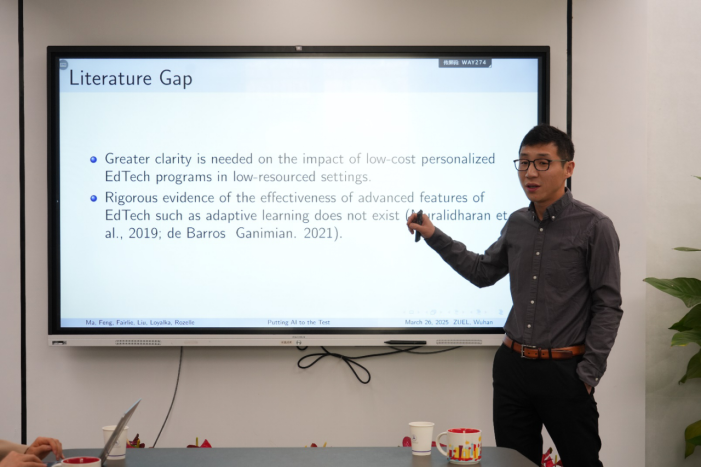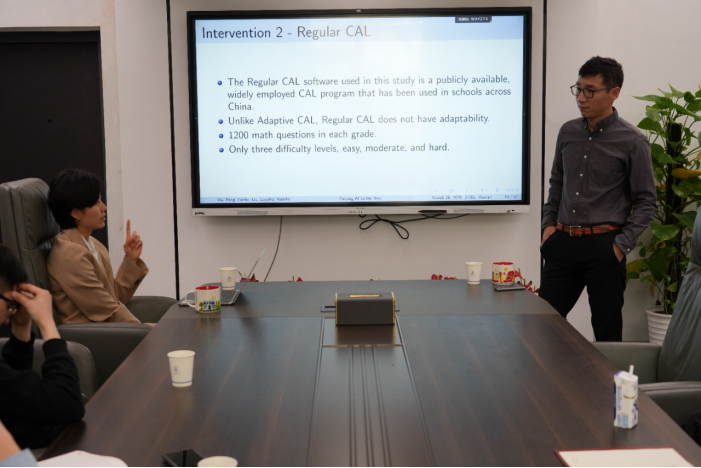(Correspondent Gao Yifei) On March 26, 2025, the 71st Xi Xian Forum was successfully held in Conference Room 119 of the Wenqin Building. This event was co-hosted by the Center for International Cooperation and Disciplinary Innovation of Income Distribution and Public Finance (111 Center), along with the School of Public Finance and Taxation, both at Zhongnan University of Economics and Law (ZUEL). The keynote speaker for this forum was Prof. Ma Yue, a researcher at the Stanford Center on China's Economy and Institutions of Stanford University, who delivered a keynote speech titled "Putting AI to the Test: Evidence from a Large-Scale RCT in Rural China". The forum was moderated by Li Shanshan, a researcher at the 111 Center, and attended by over 10 participants, including the researchers Wan Qian and Wan Xin from the Center.

At the beginning of the forum, Prof. Ma Yue shared with participants a set of comparative data from an AI-empowered education experiment conducted across 105 rural primary schools in Sichuan Province, China. The findings showed that the increase in math scores of the students using adaptive learning systems was only one-third of that of the students in the conventional computer-assisted learning group. Prof. Ma emphasized that AI technology failed to enhance students' academic performance through personalized learning.

This year-long randomized controlled trial (RCT) involved over 8,000 students in grades 4-6 and was the first of its kind to validate the effects of adaptive learning technology by applying it alone. Students were randomly assigned to one of three groups: adaptive computer-assisted learning group, conventional computer-assisted learning group, and control group. The adaptive group used a learning system where the difficulty of problems was adjusted in real time based on students' answers. The results indicated no statistically significant difference in standardized math test scores between the adaptive group and either the control group or the conventional group. One possible explanation is that adaptive computer-assisted learning may have acted as a substitute for regular homework, rather than complementing it. Heterogeneity analysis revealed that the AI intervention significantly improved outcomes for students at the middle math level. One potential reason is that the algorithm's predictions were more accurately calibrated for mid-level learners. The study also faced multiple implementation barriers, including inadequate hardware and software infrastructure in rural areas at the time.

In addition to delivering an insightful academic presentation, Prof. Ma sparked deep reflection among faculty and students on the role of AI in education. During the discussion session, faculty and students engaged in lively exchanges on issues such as enterprises' algorithmic transparency and the "black box" nature of technologies.
[Guest Profile]
Ma Yue is a researcher at the Stanford Center on China's Economy and Institutions of Stanford University. He has been studying the economics of rural education and human capital in China for 15 years. His research focuses on evaluating the impacts of early childhood development interventions and programs aimed at improving school learning outcomes. Prof. Ma has extensive experience in the fields of child development, rural education, and rural development. He specializes in conducting fieldwork and designing randomized controlled trials to assess the effectiveness of educational interventions. His work has been published in leading international journals, including Child Development, JAMA Ophthalmology, and BMJ Global Health.
